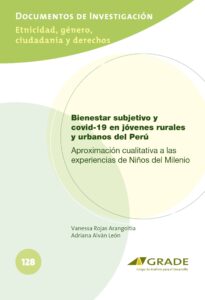Bienestar subjetivo y covid-19 en jóvenes rurales y urbanos del Perú: aproximación cualitativa a las experiencias de Niños del Milenio
| Year | : | 2024 |
|---|---|---|
| Author/s | : | Vanessa Rojas, Adriana Alván León |
| Area/s | : | Ethnicity, gender and citizenship |
Rojas Arangoitia, V. y Alván León, A. (2024). Bienestar subjetivo y covid-19 en jóvenes rurales y urbanos del Perú: aproximación cualitativa a las experiencias de Niños del Milenio. Lima: GRADE. Niños del Milenio. Documentos de Investigación, 128.
The covid-19 pandemic has had a multidimensional impact on the well-being of the youth population in general, and has been most severe in Latin America and the Caribbean.
Using longitudinal and qualitative data from the Young Lives study, the authors analyze how a group of young people from four different regions of Peru -who grew up in poverty- understand their well-being, and how they reflect on this issue in a post-confinement and pandemic context.
The findings suggest that, throughout the life cycle of the participants – childhood, adolescence and adulthood – permanence was observed in the constituent elements of their subjective well-being: family support, access to educational services, work, having a good economic situation and having individual personality characteristics. However, each of these elements is related to age, gender, area of residence and family situation. Specifically with regard to the covid-19 pandemic, the findings indicate that the perceptions of subjective well-being of these young adults would be subject to their ability to recover from the various impacts that covid-19 had on their lives.







